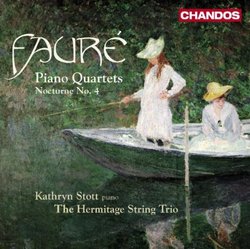| All Artists: Faure, Stott, Hermitage String Trio Title: Piano Quartets Members Wishing: 0 Total Copies: 0 Label: Chandos Original Release Date: 1/1/2010 Re-Release Date: 2/23/2010 Genre: Classical Styles: Historical Periods, Classical (c.1770-1830) Number of Discs: 1 SwapaCD Credits: 1 UPCs: 095115158227, 095115158227 |
Search - Faure, Stott, Hermitage String Trio :: Piano Quartets
 | Faure, Stott, Hermitage String Trio Piano Quartets Genre: Classical
|
Larger Image |
CD Details |
CD ReviewsThere's Lots of Competition in This Repertoire; This One is J Scott Morrison | Middlebury VT, USA | 03/08/2010 (4 out of 5 stars) "The Fauré Piano Quartets, especially the First Quartet in C Minor, Op. 15, are among his most played chamber works. Indeed the First Quartet is undoubtedly the most played of all his chamber works. It is a strong, forceful work whose tunes are especially memorable -- indeed I've been listening off and on to this disc for a week now and in between hearings the opening theme of its first movement has rarely left my mind's ear. The work is piano-dominated. In the first movement, for instance, the piano does not rest for a single bar! Construction of the piece is particularly classical. But its harmonies are quintessential early Fauré, with great dollops of modality. The Scherzo begins with delicate pizzicati in the strings followed by a particularly charming rushing theme in the piano that becomes the main idea in the whole movement. Kathryn Stott, one of Britain's finest pianists, is marvelous here. One notes that when the strings come in with a rather solemn hymn-like section the piano keeps solemnity at bay with its whirling triplets. Deliciously Fauréesque! The Adagio is solemn, even funereal, and full of feeling. At its end there is a long pedal tone on the cello above which a passage of surpassing beauty unfolds. The Allegro molto finale contrasts triplets on the piano against dotted rhythms in the strings, all at breakneck speed. (It is of note that Fauré originally composed a different finale which he then replaced five years later in 1883. Stott and her companions play the now-standard replacement.)
The Second Quartet in G Minor, Op. 45, was written roughly ten years after the first three movements of the First. Fauré's language had evolved more toward a drier but more intense one. There is some Franckian use of cyclic thematic gestures. The Scherzo is not as light and Mendelssohnian as in the First, but rather is almost primitive sounding; one pictures natives doing a war dance or preparing the sacrifice of a virgin. The pianist's left hand growls and pounds out almost Sacre de Printemps rhythms. The Adagio, in contrast, is an inward essay in nostalgia, with some implications of a distant cortège. There is a figure in the piano's left hand that reminds one a little of the same sort of thing in the Bydlo section of Mussorgsky's Pictures at an Exhibition, but it is less crudely drawn. The Finale brings us back to an outward expression of energy and jubilation. It has been described as 'a kind of possessed waltz.' One imagines mesmerized dancers whirling around a grand ballroom as seen by an observer standing outside looking through a window. The CD is filled out with the soulful reading of one of Fauré solo piano pieces, Nocturne No. 4 in E Flat, Op. 36, played by Ms Stott. There is no doubt that Kathryn Stott and the Hermitage String Trio (a Russian group consisting of Boris Garlitsky, violin; Alexander Zemtsov, viola; and Leonid Gorokhov, cello) are first-rate musicians and these performances are excellent, if just a bit generic. These quartets have been recorded many times and this CD must compete with those of Isaac Stern, Jaime Laredo, Yo-yo Ma and Emmanuel Ax Fauré: Piano Quartets (available at budget price) and Domus (with Susan Tomes) Gabriel Faure: Piano Quartets No.1 & 2, and another budget issue (one I particularly liked when I reviewed it not long ago) Cristina Ortiz and the Fine Arts Quartet Faure: Piano Quintets. So, bottom line is that you won't go wrong with this disc, but there are some that are actually somewhat better and at a lower price. Scott Morrison" |

 Track Listings (9) - Disc #1
Track Listings (9) - Disc #1